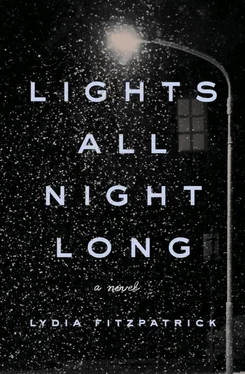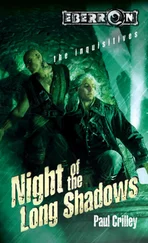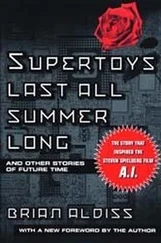Lydia Fitzpatrick - Lights All Night Long
Здесь есть возможность читать онлайн «Lydia Fitzpatrick - Lights All Night Long» весь текст электронной книги совершенно бесплатно (целиком полную версию без сокращений). В некоторых случаях можно слушать аудио, скачать через торрент в формате fb2 и присутствует краткое содержание. Город: New York, Год выпуска: 2019, ISBN: 2019, Издательство: Penguin Press, Жанр: Современная проза, на английском языке. Описание произведения, (предисловие) а так же отзывы посетителей доступны на портале библиотеки ЛибКат.
- Название:Lights All Night Long
- Автор:
- Издательство:Penguin Press
- Жанр:
- Год:2019
- Город:New York
- ISBN:978-0-52555-873-6
- Рейтинг книги:3 / 5. Голосов: 1
-
Избранное:Добавить в избранное
- Отзывы:
-
Ваша оценка:
- 60
- 1
- 2
- 3
- 4
- 5
Lights All Night Long: краткое содержание, описание и аннотация
Предлагаем к чтению аннотацию, описание, краткое содержание или предисловие (зависит от того, что написал сам автор книги «Lights All Night Long»). Если вы не нашли необходимую информацию о книге — напишите в комментариях, мы постараемся отыскать её.
Lights All Night Long — читать онлайн бесплатно полную книгу (весь текст) целиком
Ниже представлен текст книги, разбитый по страницам. Система сохранения места последней прочитанной страницы, позволяет с удобством читать онлайн бесплатно книгу «Lights All Night Long», без необходимости каждый раз заново искать на чём Вы остановились. Поставьте закладку, и сможете в любой момент перейти на страницу, на которой закончили чтение.
Интервал:
Закладка:
“Your brother confessed, Ilya. He knew things he could only know if he’d done it. If he was guilty.”
“I know, but I was with him. It doesn’t make any sense. He loved Lana. And the other two—he didn’t even know them.”
“Love can be like that. It can have two sides.” Dmitri put a hand on his shoulder. “You’re smart, right? This is what Maria is always telling me. That you have a gift . And that it is a gift to teach you, to see how a mind is supposed to work. Sometimes I’m jealous when she talks like that. Me, I’m a dolt. My mind is all rusty gears. Nothing’s a gift.”
It was true that Maria Mikhailovna said this about Ilya. She’d been saying it for four years, and it had always embarrassed him, made him feel like a fraud or an alien. “Maybe I’m not as smart as she thinks I am.”
“There are different kinds of smart,” he said. “And I’m sure that Maria’s not wrong about you. But it is not smart, it is idiotism, to tell someone—even me—that you were at the Tower with a girl the night she was killed. Do you understand that? Do you know how quickly people could believe that it was you and your brother—or even the three of you? Aksinya too. That you all worked together?”
He was right. Ilya could see that, and he understood that he’d been naive to think himself above whatever trouble Vladimir had fallen into. A new sort of panic hit him with force. Not only had he been with Lana the night she’d died, he’d kissed her. He pictured himself holding her, leaving bits of skin and hair and who knew what other traces of himself.
“He’s your brother. You love him,” Dmitri said, and his voice was soft and level. “I know that, and I’m sorry, but there’s not an alibi in the world that can help him. Not after he’s admitted to it all.” Dmitri sounded sorry, truly sorry, and his apology felt like a dead end, as final as a prison cell. Then Dmitri reached out and put his palms on Ilya’s cheeks. He leaned in and kissed Ilya on the forehead. “Soon you’ll be gone. Soon you’ll start over,” he said. Ilya looked over the epaulets on his shoulder. The babushka was staring at him. Then she turned and climbed the stairs back into the station, the empty bucket banging at her hip.
CHAPTER TWENTY-SEVEN
Two days after Ilya called Maria Mikhailovna, the news of Dmitri’s suicide broke in the Vecherniye Berlozhniki . He had driven his car off the Bolshoi Bridge and straight into the Pechora, the same river into which Vladimir had claimed to have thrown the knife. It was a mild day for October, the paper said, so a number of people were out picnicking at the tables that lined the river’s banks and had witnessed the crash. One man, who’d narrowly avoided being hit by Dmitri’s car, said he’d never seen a vehicle move so fast. Another man said it had been flying. And the car must have been, at least for a moment, because it sailed almost entirely over the river before crashing in the muddy shallows and bursting into flames.
Suicides were not so uncommon in Berlozhniki, nor were violent deaths. After suggesting that the refinery pay city taxes, the former mayor had been stabbed in broad daylight in front of the statue of Iron Felix. His wife shot herself the next day. But Dmitri’s death had been spectacular.
“It was like a meteor strike,” one woman said, to describe the impact. There had been enough petrol in the tank that for a full minute it seemed as though the river itself were in flames. And perhaps because of the fire, it took a while for the reports to shift from one casualty to two.
For a sickening hour, Ilya feared that the second casualty was Maria Mikhailovna. He imagined Dmitri taking her down in the elevator, down into that cavernous garage, where her footsteps would sound so small, but another article soon took over the paper’s home page announcing that the passenger had been Fyodor Fetisov, one of Russia’s richest men, the majority owner of Gazneft.
Dmitri had been driving Fetisov from the airstrip on Berlozhniki’s south side to the refinery—the newspaper explained that Fetisov made occasional visits to Berlozhniki and that Malikov was his driver—when Malikov lost control of the car, or, as bystanders claimed, drove it intentionally off the Bolshoi Bridge.
Ilya had noticed that Russia did not feature in the American news nearly as much as America featured in the Russian news, but evidently it was a drama-free day in America, because Fetisov’s death made the American news almost instantly.
“You know this guy?” Papa Cam hollered down the basement stairs, and when Ilya came into the den and saw Fetisov’s face, his eyes so big that they seemed to greedily take in the room, he knew. He could picture Fetisov hitting Vladimir on the elevator, the ring slicing Vladimir’s cheek. He could feel the way it had snagged his skin when they’d shaken hands on the stage.
Then the picture shrank and was dispatched to a corner of the screen. A Moscow correspondent, a woman of unclear nationality with bright red curls and a face made fuzzy by makeup, said, “To give you a little background on Fetisov. He’s an oligarch, on the Forbes 500. He’s famous, even in his own set, for his decadence… .”
She went on, describing a maelstrom of champagne and caviar and fine art and prostitutes and private jets, all the decadence that Ilya and Vladimir and Sergey had imagined as boys, sitting damp-assed in the snow by the refinery fence. Then she paused and touched the mic in her ear, and Ilya saw that she knew now too.
“We’ve just gotten confirmation that Fetisov’s death was likely a murder-suicide,” she said, and she described a note left by Dmitri accusing Fetisov of three murders in Berlozhniki, the “Gulag Murders,” as they were called by the American press for the hour they made the news, though the murders had had nothing at all to do with the gulag.
Online, Ilya found clips from Russia 1 on the story. The network summarized Dmitri’s suicide note in depth. Apparently he had begun to suspect Fetisov because the first two murders coincided with Fetisov’s visits to Berlozhniki, which were rare and brief. When Lana’s body was discovered, the date of her murder coincided with a visit from Fetisov as well, but it wasn’t until Fetisov asked Dmitri to get rid of a witness—Gabe, trudging along the lumber road at just the moment when Fetisov had returned to the grove—that Dmitri was sure of Fetisov’s guilt. And Fetisov had not seemed to care if Dmitri knew. He didn’t need to care, Dmitri explained, because he’d threatened to kill Dmitri’s wife if Dmitri didn’t take care of the witness and find someone else on whom to pin the murders. So the witness had been taken care of.
“Malikov doesn’t explain how he took care of the witness except to say that he didn’t kill anyone,” the newscaster said. “And apparently a local teen was put in prison for the murders.”
The newscaster paused. She was practically panting with excitement or horror. The wrong emotion, whatever it was, and Ilya wanted to throttle her weedy neck, to make her feel, for a moment, as trapped as Vladimir had been, as Dmitri had been. Then she gathered herself and said, “Unfortunately the final lines of the note are redacted. They were a last good-bye addressed to his wife, and she’s chosen to keep them private.”
As the news cycle wore on, Fetisov was linked to a handful of other murders in other refinery towns, to women stabbed in Ukhta and Krasnodar and Orsk. Other women who’d survived him came forward too—a waitress, an escort, a stewardess—to detail the abuses they’d suffered at his hands. The newscaster interviewed one girl with long brown hair and blue eyes, and for a moment Ilya thought it was Aksinya, or maybe her sister, but the newscaster identified her as Irina from Ukhta. Irina said that Fetisov had hired her for a week, and that all he’d wanted to do was to cut her cheeks.
Читать дальшеИнтервал:
Закладка:
Похожие книги на «Lights All Night Long»
Представляем Вашему вниманию похожие книги на «Lights All Night Long» списком для выбора. Мы отобрали схожую по названию и смыслу литературу в надежде предоставить читателям больше вариантов отыскать новые, интересные, ещё непрочитанные произведения.
Обсуждение, отзывы о книге «Lights All Night Long» и просто собственные мнения читателей. Оставьте ваши комментарии, напишите, что Вы думаете о произведении, его смысле или главных героях. Укажите что конкретно понравилось, а что нет, и почему Вы так считаете.












